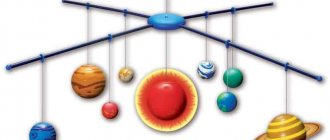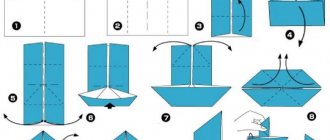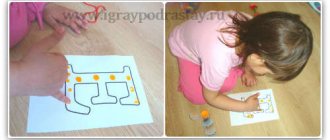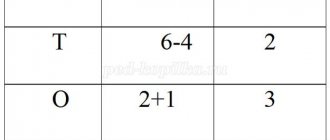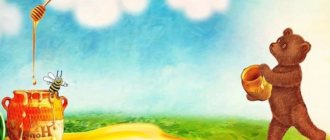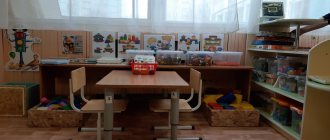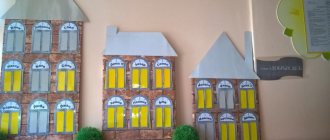Family and preschool are two important institutions for the socialization of children. Their educational functions are different, but their interaction is necessary for the comprehensive development of the child. The Federal State Educational Standard for Education says this: a preschool institution must create conditions that will facilitate the involvement of parents in the educational process. Such a condition could be a family club in a preschool educational institution. What is it?
A family club is an innovative form of working with parents, which allows you to provide psychological and pedagogical support to parents, increase their competence in matters of development and education of children, attract parents to participate in the educational process, and also contributes to the creation of partnership, trusting relationships between the kindergarten and the family .
In my work, I also use this form of working with parents and I have created the “Commonwealth” family club.
Objectives of the family club
- to intensify the work of the institution with parents (legal representatives) of pupils, the creation of a social and pedagogical environment “child-kindergarten-family”;
- provide psychological and pedagogical assistance to parents (legal representatives) in creating a favorable psycho-emotional climate in children’s families;
- improve the psychological and pedagogical culture of parents;
- to form positive attitudes in raising children;
- harmonization of parent-child relationships;
- contribute to the establishment of trusting relationships between parents and kindergarten.
What to call a children's club, kindergarten?
Coming up with a name for your children's center is almost as responsible and sometimes as difficult as giving a name to your child.
To be successful, a children's club must surprise. Imagine: a mother walks into a children's club. Let's say it's called "Rainbow". He sees that the chairs are exactly the same as in kindergarten, only newer. The cabinets are from the neighboring furniture store. Toys from Detsky Mir are opposite.
“What are you doing here with the children?” “We draw, sculpt from plasticine, do exercises,” she answers. “What materials do you use?” - “We work according to this coloring book and this ABC book.”
Do you think mom will pay money for this? I doubt! Why?
Reason #1. Mom will think: “Yes, I can buy a coloring book, an ABC book and plasticine myself. What's so difficult about it? Why would I pay money for this? So, not only can I conduct classes myself, I can open the same club myself.”
Reason #2. The name “Rainbow”, familiar chairs - all this evokes associations with the Soviet past. Mom saw a children’s “circle” in the House of Folk Art or in the House of Culture of the Soviet years. And genetic memory tells my mother: “The Soviet “circle” should be free!”
Hence follows Rule No. 1 of a Successful Children's Club . With all your might you need to “detach yourself” from straightforward Soviet images! Not because Soviet preschool education was bad—it was often very good. But because in people’s minds, Soviet things should be free. Therefore, do not call your club by hackneyed Soviet names: “Ladushki”, “Ladoshki”, “Fairy Tale”, “Spring”, “Firefly”, “Luchik”, “Morozko”, “Rainbow”, etc.
The most successful and modern names of Moscow children's clubs are, in my opinion, “Smiley”, “Mozart-Effect”, “Talentville”. I still think that the name under which my club operated in the first year of its existence was wonderful - “Studio-Pups”. Then we taught very young children, and when we started teaching children from 5 to 9 years old, we had to change the name to a more “adult” one.
The names sound cool and fresh with words borrowed from European languages, such as Baby (Baby Club, Baby Star), Kid (Kid Land, Kid House). Anglicized words sound even more perky when combined with the good old “scoop”.
For example, the children's club "Romashka" makes my cheekbones ache with boredom. “ROMASHKA BABY STUDIO” is much more impressive.
Or give your club a name similar to the Soviet canteen No. 1 - BABY CLUB No. 1. At a minimum, they will be interested in you and want to visit you.
Another article on the topic: “How to create a good logo for a children’s center.”
Thematic planning of the family club "Commonwealth"
| № | Topics of the meetings | Form of conduct | Term |
| 1 | Me and my child | Workshop | September |
| 2 | Happiness is when we are all together | Child-parent training | November |
| 3 | Play together | Joint activity between parents and children | January |
| 4 | We are together | Child-parent training | March |
| 5 | Learning to Express Anger | Joint activity between parents and children | May |
A set of materials on how a psychologist works with parents
The kit includes the family club "COMMONWEALTH" with notes of events + visual information for parents
Progress of the lesson
1. Opening remarks.
— Good evening, dear adults and children. We are pleased to welcome you to the traditional meeting of the parent club “ Family Living Room ”
.
Our meeting is called “We are together”
, the purpose of which is to bring you closer through games and joint activities.
All our games may seem unusual to you, don’t be afraid to play, seem wrong and funny, each game has its own result and meaning. Let's start the meeting with a greeting.
2. Greeting. Each participant greets everyone with the words: “Hello, I’m Victoria”
(in a circle, standing)
.
3. Getting to know each other. Take your seats and let's continue our acquaintance,
Children take turns standing up and introducing themselves and their families with whom they came to meet.
And now, to relieve stress, we suggest you play a little.
4. "Unite those who..."
Participants are encouraged to team up if the description fits. Move to one side for those who:
- do homework together, at least occasionally, for the other, for those who don’t have enough time for it;
- have a common hobby - fishing, knitting, sports, collections;
— help relatives wash the dishes;
— help relatives take out the trash;
- travel together, relax - go to the forest, to the river.
- Now we invite you to sit down.
5. Main part. "Cooperation"
.
— Today the dynamics of life are too fast. Everything happens in a hurry. Remember how the morning begins in your home. In the morning, you give the children instructions, reminding them how they should behave during the day. Next time we meet with the children in the evening. Today we are given the opportunity to spend the evening together. Find out more about each other and get closer.
6. "Know Your Parent "
.
“Now we will check how well the children know their relatives.”
We blindfold the driving child. All adults sit in their places - children must recognize their mother by touch and explain how they guessed.
7. "Describe your mother"
. Now let’s check how well adults know their children. The children have prepared short essays about you, we will read them to you, and you can try to recognize yourself from the description.
The essays are read one by one.
8. "Cozy and safe place"
- relaxation.
- And now we invite you to relax and dream a little,
dream up. (relaxation text on the topic “Our Home”
).
9. "Collaborative drawing"
- Our house.
Now let's try to realize your dream with the help of drawing, now you are together, at the same time you will draw “The House of Your Dreams”
using two pencils,
parents - red , children - blue.
They draw against the background of music. Next, the drawing is analyzed. Pay attention to which color was larger, which means that he was more active and showed more initiative. If you are an adult, it means that you do not always allow the child to show his independence. If it’s the other way around, it means that you often give in to the child. A positive result is when it’s 50/50.
— Let's arrange our exhibition. Analysis - do you like your home in our “City of Friendship”
? If you like it, then let's give each other compliments.
10. "Compliments"
.
Standing opposite each other, taking a step towards each other, they say compliments. When meeting, the child gives his mother a flower, and his mother hugs him. Result: was it hard to give compliments? Do you often say them in everyday life?
11. "We are together"
-
group work .
“Our meeting takes place in an atmosphere of warmth and comfort, and this is not enough in the picture, let’s revive it, add bright colors.” Drawing with palms. Group photo as a keepsake against a collage background.
12. Conclusion. Our meeting has come to an end. We wish you to remain as kind, cheerful, friendly always and spend more time with each other.
Meeting topic No. 3 - “ Family values ”
Goals:
Expanding opportunities for the formation of family values and traditions.
Tasks:
- talk with parents about family , family traditions and their importance in the upbringing and development of the child;
- contribute to the establishment of friendly, good relations between generations in the family;
— activation and increase of parents’ interest in creating family values .
Material:
- sheets of A4 paper, pens, pencils, tape recorder, handouts.
Parents' club "Igralochka" in the early age group
Regulations on the parent club "Igralochka"
1. General Provisions
1.1 These regulations govern the activities of the parent club “Igralochka!” (hereinafter referred to as the Club, organized at the Municipal Budgetary Preschool Educational Institution “Kindergarten No. 43” in Syktyvkar).
1.2 The club was organized with the aim of creating conditions for interaction between children and adults through the organization of a single educational space of the preschool educational institution and the family of group No. 13 of the preschool educational institution.
1.3 The club carries out its activities in accordance with regulations in the field of education, the Charter of the preschool educational institution, and these regulations.
1.4 The club participants are parents (legal representatives) and students of group No. 13, teachers.
1.5 The club is an additional component of the educational process, where parents are involved in the system of joint interaction of the educational process of preschool educational institutions through various forms of work.
1.6 Purpose of the club: Creating conditions for interaction between children and adults through various forms of educational work.
1.7 Objectives of the club:
To interest parents in the development of joint play activities that ensure successful socialization and adaptation;
Expand parents’ ideas about forms of family leisure through various forms of joint activities;
Involving parents in active forms of joint activities with their children, through participation in joint theatrical performances in the Russian National Social Sciences, entertainment;
Development of fine motor skills through the organization of various joint activities with parents.
2. Main activities of the club
2.1 Providing consulting assistance to parents of children on problems with gaming activities.
2.2 Promoting the positive experience of family education of a healthy lifestyle.
2.3 Increasing the pedagogical knowledge of parents.
2.4 Popularization of the activities of preschool educational institutions.
2.5 Formation of parent-child relationships through joint gaming activities.
3. Organization of club activities
3.1 The work of the club is carried out on the basis of preschool educational institutions from September to May 2020.
3.2 The club is visited by parents (legal representatives) of pupils of group No. 13 “Sun”.
3.3 The composition of parents (legal representatives) - club participants may change depending on their needs for activities and interests.
3.4 Planning of the Club’s work is carried out taking into account the interests of parents (legal representatives). The work plan is approved at the first meeting of the club.
3.5 Forms of organizing the work of the Club: round tables, psychological trainings, solving pedagogical situations, integrated joint classes, discussion of the experience of family education, video viewings of materials on organizing the lives of children in preschool educational institutions. The first part of the club is theory, the second part is practice (game).
4. Rights and obligations of club members.
4.1 Parents (legal representatives) have the right:
— to receive qualified advice on raising a child;
- to receive practical assistance in organizing activities with children at home;
— to express one’s own opinion and share experiences in raising children.
4.2 The preschool educational institution has the right:
- to study and disseminate positive experiences of family education;
— making adjustments to the Club’s work plan depending on emerging problems, interests and requests of parents (legal representatives).
4.3 Parents are required to comply with ethical standards.
4.4 The preschool educational institution is obliged to:
— organize the work of the Club in accordance with the plan approved by the head of the preschool educational institution and taking into account the interests and needs of parents (legal representatives);
— provide qualified advisory and practical assistance to parents (legal representatives).
5. Documentation
5.1 The club operates according to the plan approved at the beginning of the school year.
5.2 Events of the parent club “Igralochka” are recorded in the following form:
– date of the event;
– theme of the event;
– number of parents (legal representatives) present;
– signature of teachers.
6.Evaluation stage
The effectiveness of the work of this club can be judged by the results of the number of visitors and the activation of parents at the meeting of the club - sociometry club.
Long-term work plan for the parent club “Igralochka!”
for the 2019-2020 academic year.
| № | Month | Events | Responsible |
| 1. | September | Opening of the “Igralochka” club - Approval of the work plan Goal: to interest parents in visiting the club. -Draw and approve a work plan. -Parent survey: “My baby’s free time” -Tea party “Let’s get to know each other” -Exhibition of games in a group. -Excursion in a group to game centers. | Teachers: Garayeva E.N. |
| 2. | October | Creative workshop “Crazy Hands” -Parent meeting: “The importance of play activities for the comprehensive development of preschool children.” Goal: to reveal the importance of games in the development of a child. -Master class (on salt dough). Goal: Acquaintance with the capabilities of salt dough and its use in the process of artistic creativity (modeling). — Consultation on the topic: “Developing fingers.” -Finger games “Gingerbread” -Booklets for parents on the topic: “Organizing games with children at home.” -Selection of exercises for finger gymnastics with children at home. | Teachers: Garayeva E.N. |
| 3. | November | Game library -Non-traditional physical education activity with a newspaper -Outdoor game “Wolves and Hares” -Consultation on the topic: “Outdoor games as a way to strengthen and develop children.” -Booklets for parents on the topic: “Family-scale games”, “Selection of outdoor games on the street and at home” | Teachers: Garayeva E.N. |
| 4. | December | "Visiting a fairy tale" Goal: promote family cohesion. To foster the creative initiative of parents in theatrical activities. -Consultation for parents: “Home toy library for educational games with children | Teachers: Garayeva E.N. |
| 5. | January | Holidays "Winter fun" Goal: creating motivation for active participation in entertainment, promoting family cohesion, developing children’s creative abilities, and developing cooperation skills. -Construction of snow buildings on the site. -Publishing the wall newspaper “Winter Fun with the Family.” Goal: Raising parental awareness. -Consultation for parents: “How to spend the winter holidays with your family?” -Booklets for parents on the topic: “Joint games with parents on a walk” | Teachers: Garayeva E.N. |
| 6. | February | Country "Sportlandia" Goal: to develop the needs for active motor activity. Develop a positive attitude towards playing together and a healthy lifestyle. -Entertainment -Consultation for parents -Wall newspaper release | Teachers: Garayeva E.N. |
| 7. | March | Musical chest — Consultation on the topic: “Music in a child’s life” — Musical games “Loud-quiet”, “Applause” - Booklets for parents on the topic: “Musical games with a child at home” — Master class on making musical instruments from waste material | Teachers: Garayeva E.N. |
| 8. | April | Creative workshop - Consultation on the topic: “The importance of drawing in a child’s life” - Introducing parents to non-traditional drawing techniques - Team work with a combination of various drawing techniques “Big friendly family” - Booklet for parents on the topic: “Draw with me, Mom” | Teachers: Garayeva E.N. |
| 9. | May | Spring is sweeping the planet! - Action “Take care of primroses!”: Making a collage “Tulips in a vase” Creation of an album “Primroses” Final meeting of the club: - Summing up the work done - Preparation of a photo report of joint events. Setting goals for the future. Rewarding participants in the parent club. -Parents meeting “Our successes” -Booklet for parents “Oh, what color is summer?!” -Consultations for parents on the topic of summer. | Teachers: Garayeva E.N. |

